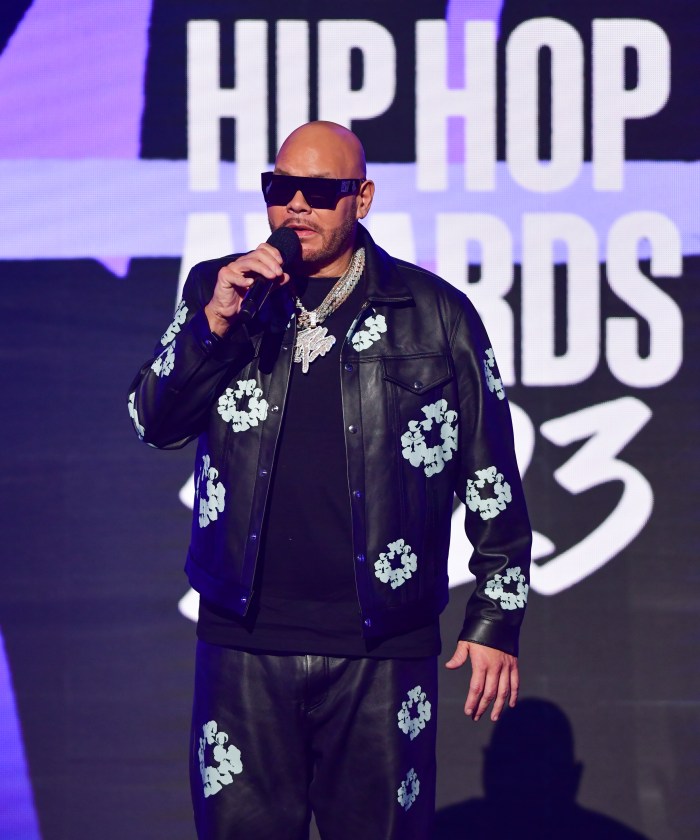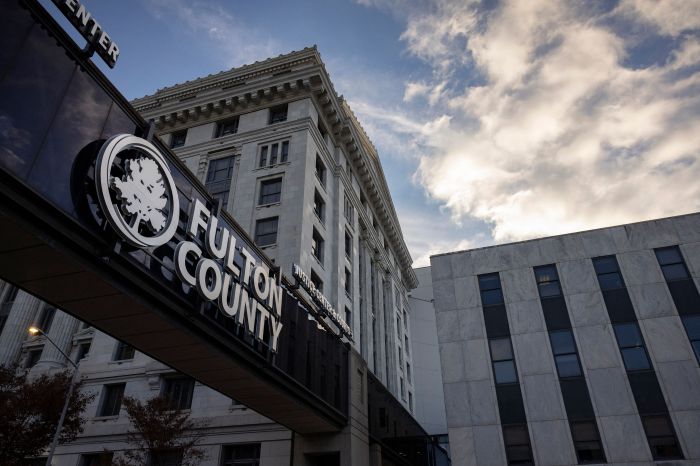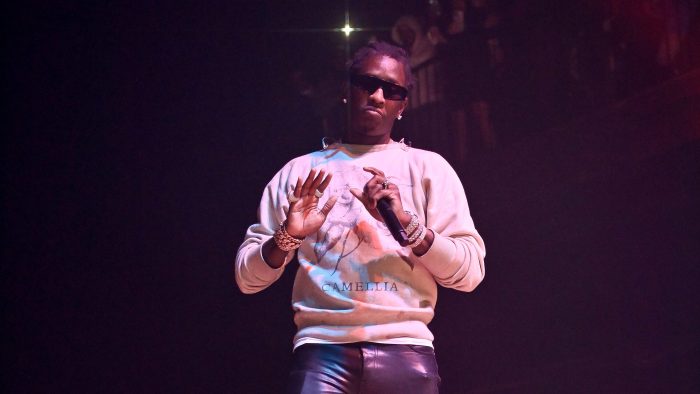The trial of Young Thug is putting hip-hop in an awkward place: After 50 years of creating a culture from the authenticity of lived experiences, major rap figures are saying our music is built on lies.
As said on many a microphone – I ain’t buying it.
Rap music is inseparable from “the streets.” When rappers compare themselves with actors playing a role or novelists inventing a story, it turns hip-hop’s powerful outsider narratives into cheap fantasies. There’s also a dangerous flip side: Saying rap isn’t “real” ignores the human consequences of the murder and mayhem we describe in our music. Hip-hop has been talking for years about the concept of “rap on trial” – prosecutors subverting free speech and using the rules of evidence to prosecute rappers with their own lyrics. I don’t trust the government, but I also don’t think we should lie about what rap really is. With a star like Young Thug on trial, it’s time to reassess this defense.
The 31-year-old Atlanta rapper, born Jeffery Lamar Williams, is accused of co-founding a Young Slime Life gang that has allegedly committed numerous criminal acts, including murder. Young Thug was indicted along with 27 other defendants, including the hitmaking artist Gunna and several other rappers; five co-defendants remain part of his trial. Young Thug faces up to 20 years in prison if convicted by a jury of seven Black women, two Black men, two white women and one white man.
The judge is permitting various Young Thug raps to be used as evidence. Prosecutors say lines such as “this that mob life” are evidence that YSL is a gang. Young Thug’s lyrics “I’m a boss, I call the shots” allegedly demonstrate that he was the leader. The trial is based on racketeering statutes that make gang leaders responsible for crimes committed by their organizations.
The trial has produced some unintentionally ludicrous moments, like when Young Thug’s lawyer said his name was an acronym for Truly Humble Under God. A humble rapper? OK. At another point, a lawyer for codefendant Yak Gotti said that the lyric “I got bodies on bodies” doesn’t refer to murder victims, but sex partners. I guess he’s not familiar with another popular rap word for female conquests that starts with the letter B.
The wildest quotes, though, came from the rap legend Fat Joe, who is not connected to the case. He took Young Thug’s side in a recent interview with journalist Gayle King.
“I’ve been rapping professionally for 30 years, I’ve lied in almost 95% of my songs,” Fat Joe said. “I write like I feel that day. I’m just being creative. You couldn’t build a jail high enough for the lyrics I’ve said on songs, which are all untrue. What I am is a family man, a person who gives back to my community all the time … The music would never amount to the actual person.”

Prince Williams/WireImage
Say it ain’t so, Joe.
The artist, also known as Joe Crack, is a hip-hop legend due to his longevity and hits like “Lean Back” and “All The Way Up.” I’ve enjoyed his music since his debut on Diamond D’s classic 1992 album Stunts, Blunts & Hip-Hop, and his first solo album, 1993’s Represent. Fat Joe’s lyrics were superbasic then, but his rhymes describing stickups, dope dealing and gunplay were soaked in sincerity. “Let me let ya know why I made this song / Brothers can’t deal with the real, word is bond / Sayin that they catchin’ bodies when they never pulled a trigga,” he rapped on the single “The S— Is Real.”
Yes, he has evolved at age 53, but I’m supposed to believe Fat Joe was never a real gangster? Nah. He seemed the type to follow the rap code that says: Don’t front. Don’t pretend to be something you’re not. Listening to Fat Joe back then – and that DJ Premier remix! – I knew in my bones that “The S— Is Real” was real.
But after Fat Joe said what he said to King, I had to double-check. So I read his memoir, The Book of Jose, co-written with Shaheem Reid. Sure enough, Fat Joe writes that as a young teen he was the leader of a gang in the Bronx, New York, dubbed the Terror Squad that robbed and beat down folks on the regular, then graduated into major drug dealing. He poured all of that into his music: “People could sense in my voice and delivery that I was a real dude. … Whatever I was rapping about, they could tell I’d actually lived it,” he wrote.
Fat Joe’s book also said, “I was frustrated that a lot of those cookie-dough-soft rappers pretending to be gangsters were getting deals by lying in their raps. I thought most of them kickin’ that street lore were frontin’. I was spittin’ the real.”
Fat Joe writes that he stopped hustling when he entered the music business, but his Terror Squad remained, both as his crew and as the name of his record label. He’s careful not to tell on himself, but makes it clear that even after he stopped hustling, Terror Squad remained ready and willing to use guns or whatever else to navigate the violent rap industry.
This is how hip-hop has twisted itself into a pretzel with the “you can’t put rap on trial” defense. One minute Fat Joe is staking his career on how “real” his music is. The next, he says he’s making it all up.
One factor in this tango with the truth is that there is a strong element of self-preservation when Young Thug or anyone else is facing decades behind bars. It would be dumb for him not to say that his raps are fictional. This connects to the deep folklore of mobsters (whom many rappers admire and imitate) lying to avoid prison. It’s sort of meta to unravel the idea that lying about being a mobster is an indication of mob affiliation, but it’s not out of the question.
I can understand wanting to defend rap against an overzealous government. I’m aware of the ways that rap lyrics have been used unfairly, like in the trial of Drakeo the Ruler, where prosecutors claimed run-of-the-mill gangsta raps were evidence of a murder plot. Judges have treated rap differently from other forms of expression when it comes to deciding whether the music can be used as evidence. None of that is OK. But as we push back against those injustices, let’s not lie to ourselves about the credibility that hip-hop has always given to artists who lived what they rap about. Most rappers want that kind of respect.

Christian MONTERROSA/AFP via Getty Images
When YoungBoy takes credit for “seven murders” on “Dead Trollz,” I believe him. Jay Z really did get pulled over by police with kilos of drugs in his trunk, as he described in “99 Problems.” 50 Cent lived his music. The code of hip-hop demands a high level of authenticity from rappers. If they’re not really about that street life and still rap about doing dirt, they will get called out by real Gs, with potentially dangerous consequences. Fronting has a short shelf life in this culture.
At the same time, it’s not a contradiction that lots of rappers without Fat Joe’s rap sheet make music where they “exaggerate, dream and imaginate.” (Rick Ross, please report to the warden’s office.) There’s a well-established zone in hip-hop that permits artists to describe, sometimes in the first person, criminal acts they have witnessed or heard of, but not committed. Gangster rap pioneer Schoolly D may not have been a full-fledged member of the Park Side Killas, but he had the gang’s encouragement to rap the classic “P.S.K.” Eazy-E was the real dope dealer of N.W.A.; Ice Cube and Dre were gifted artists who channeled their environments. Lil Wayne isn’t a criminal, he’s a child prodigy who started recording professionally at age 11, but he has certainly has been exposed to the things he raps about growing up under feared street figures like Birdman and Slim.
I’m not saying that every rap by Young Thug or Fat Joe describes real events. But when Fat Joe says his raps ain’t real, he becomes what he says he despises: a pretender. And when Fat Joe’s claim is extended to rap as a whole, it diminishes rap’s ability to be a voice for the voiceless and the “CNN of the ghetto.” It pushes the music toward pure financial exploitation of killing and suffering.
That’s the bigger danger I see when rap lies about the truth it contains. I’m old enough to remember when rappers defended violent and explicit lyrics by saying, accurately, that they were describing a reality much of America wanted to ignore. To me, that was the main redeeming quality of music like Young Thug’s that included so many horrific acts. Like Fat Joe wrote in his book, this was their reality. I could appreciate that being turned into art.
But if the music of Young Thug and others is just imaginary scenarios, then hip-hop is reduced to exploiting our worst vices for profit. If someone doesn’t really know those experiences, I don’t respect him making money from it. It’s not his reality to sell. Truth be told, I believe Young Thug’s raps like I believe Fat Joe’s. I have no idea if Young Thug is guilty of what’s in the indictment, but just like rap music itself, Young Thug can’t have it both ways. He can’t be real on record and fake when things get hot.
Hip-hop is and always has been grounded in the actual facts of Black life, as ugly, inspiring or shameful as they may be. That’s the uncomfortable truth about Young Thug’s lyrics and his trial. We have to face the music.
This post was originally published on this site be sure to check out more of their content.







